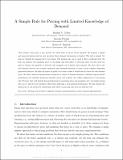A Simple Rule for Pricing with Limited Knowledge of Demand
Author(s)
Cohen, Maxime C; Perakis, Georgia; Pindyck, Robert S
DownloadAccepted version (557.6Kb)
Open Access Policy
Open Access Policy
Creative Commons Attribution-Noncommercial-Share Alike
Terms of use
Metadata
Show full item recordAbstract
Copyright: © 2020 INFORMS How should a firm price a new product for which little is known about demand? We propose a simple and practical pricing rule for new products where demand information is limited. The rule is simple: Set price as though the demand curve were linear. Our pricing rule can be used if three conditions hold: the firm can estimate the maximum price it can charge and still expect to sell some units, the firm need not plan in advance the quantity it will sell, and marginal cost is known and constant. We show that if the true demand curve is one of many commonly used demand functions, or even a more complex (randomly generated) function, the firm can expect its profit to be close to what it would earn if it knew the true demand curve. We derive analytical performance bounds for a variety of demand functions, calculate expected profit performance for randomly generated demand curves, and evaluate the welfare implications of our pricing rule. We show that with limited demand information (maximum price and marginal cost), our simple pricing rule can be used for new products while often achieving a near-optimal performance. We also discuss the limitations of our method by identifying cases where our pricing rule does not perform well.
Date issued
2021Department
Sloan School of ManagementJournal
Management Science
Publisher
Institute for Operations Research and the Management Sciences (INFORMS)